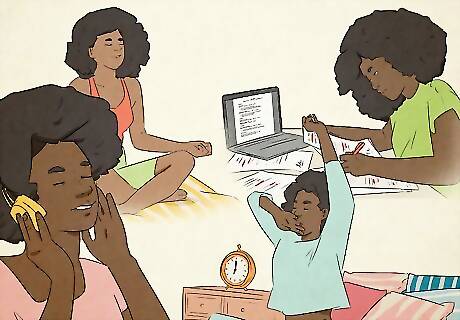
views
- You might feel like you don’t know what you’re doing if you’re living your life for others and not pursuing your own goals or passions.
- You may feel like you’re on autopilot if you don’t have clear goals or a sense of purpose, or if you’re just in a rut.
- You can regain control by focusing on yourself, what you want to do with your life, and how you can take steps to achieve your dreams, no matter what anyone thinks.
Why You Might Be Feeling Lost Right Now

You’re living your life for others. Living your life according to what you think others want or prioritizing other people’s needs above your own can leave you feeling unfulfilled, uncertain, and unseen. You may feel like you’re not your own person or you have no control over your life, because you’re used to handing the reins over to someone else. Maybe you’re pursuing a certain career because it’s what other people think you should be doing. Maybe you struggle to have the confidence to be yourself and tend to follow the crowd. Living your life for others can have negative effects on your emotional wellbeing.

You’ve got imposter syndrome. Even if you’re living the life you’ve always wanted, if you feel as if you didn’t earn your success, it can leave you feeling just as miserable as if you’d never achieved your goals at all. Imposter syndrome can take a painful toll on your mental and emotional health as well as your career: you may suffer from fear that you’ll be “found out” and that your success will be taken from you. This may lead to anxiety or depression, career burnout, and less professional risk-taking. If you’re struggling with imposter syndrome, you’re not alone: this condition affects up to 82% of people.

You lack defined goals or a sense of purpose. Do you feel as if you’re just wandering through life, taking it as it comes? Maybe you had dreams when you were a kid that you haven’t quite achieved in adulthood, or maybe you’ve just never felt fully sure who you were. Not having a sense of purpose or knowing where your life is heading can make you feel as if you’re not in control, or maybe as if you just don’t even exist.

You feel stuck in your routine. Even if you have what you consider a good life, the same old is the same old. Being stuck in a rut can leave you feeling depressed and uncertain about the future. You may wish you could feel thrilled or excited by something new, but nothing’s really on the horizon. Maybe you know what the next chapter of your life might be but aren’t sure how to get there. Or maybe you’ve achieved certain milestones you’ve waited and worked a long time for, and are wondering what, if anything, is next.
How to Overcome this Feeling

Go easy on yourself. Sometimes you may feel lost because your standards are unrealistic. If you’re expecting yourself to live up to standards set by someone else, or if you’re a perfectionist who struggles to not be 100% perfect all the time, try to practice some self-compassion. By extending grace towards yourself, you may find it easier to regain control and feel more independent. If you had certain life plans for yourself that you haven’t accomplished yet, you may feel as if you’re not where you “should” be in life. While goals can be helpful, life doesn’t always follow a plan! Practice letting go of your expectations and enjoy the freedom to not be tethered to an arbitrary timeline.

Get out of your comfort zone. It may sound paradoxical, but sticking to your comfort zone, where you have control over your life, may make you feel less fulfilled and less sure of yourself. Getting out of a rut and feeling more purposeful may require you to try something new and push the boundaries of your comfort zone. This may mean taking the plunge and quitting your unsatisfying job, or just dipping your toe into some new hobbies. What have you always wanted to do but been too afraid to? You might play a new sport, travel to a new city, join a club, take up an instrument—the world is your oyster!

Avoid comparing yourself to others. “Comparison is the thief of joy,” Teddy Roosevelt allegedly said. If you spend a lot of time and energy wishing you were like other people or envying their lives, you’re likely to feel as if you come up short. Try to take regular time away from arenas where you’ll be tempted to compare (such as social media), and remind yourself you don’t know what’s beneath the surface of other people’s lives. When you feel the urge to compare, try to find one thing to be grateful for about you or your life instead. Practicing gratitude won’t erase feelings of unfulfillment, but it may help give you a more positive, confident outlook.

Challenge limiting beliefs about yourself. Limiting beliefs are negative opinions about yourself, your abilities, and your worth which may have been instilled during childhood or up into adulthood, and which can prevent you from living life to the fullest or taking chances. If you’re holding onto negative opinions about yourself, practice combating them: Next time you feel overwhelmed with self-doubt, acknowledge that feeling, and acknowledge that it is only a belief—not the truth. Try on a different, more positive belief about yourself—one aligned with the ideal vision you have of yourself. For instance, if you’re struggling with finances, you might say, “I’m not doing so well right now, but with careful budgeting, I can improve my situation.” Finally, act as if your new belief is true: maybe you seek out a higher-paying job, adopt a strict budget, or speak to a financial advisor. Acting on your positive beliefs might feel unnatural at first; your impulse is likely to act as if your limiting belief is reality. But over time, as you practice believing in yourself, it’ll become second-nature.

Focus on you. If you’ve been living your life for others, it’s time to turn the focus onto you. A little self-care may help you feel more confident and in control of your life. Practice tending to your needs above others’, and the next time you feel compelled to do something you think someone wants you to do, pause and ask yourself what you really want. Focusing on you might mean taking more time to exercise, eat healthy, meditate, and engage in hobbies. It may also involve actively saying “no” to other people and practicing asserting your opinions more firmly, even if they go against what the people around you feel.

Practice mindfulness. Mindfulness is one of the internet’s favorite buzzwords of the last decade, but it’s a buzzword with substance to back it up. If you feel out of touch with your life or as if you don’t have agency, becoming more engaged with your environment may help you feel more grounded and sure of yourself. Set up a regular meditation practice. Just 10 minutes a day of meditation can help improve your mood, attitude, memory, and attention span. Set aside 10 minutes of your day for uninterrupted, distraction-less meditation time. Practice inhaling and exhaling slowly, making an effort to notice your breath as it cycles in and out of your body. Pay attention to all of the sensations you’re experiencing: what does the chair you’re sitting in feel like? How does the air feel? Focus on your bodily sensations for 10-20 minutes.

Follow your passions. As Mary Oliver famously wrote, “[W]hat is it you plan to do / with your one wild and precious life?” There is no roadmap to the perfect life, and we only get the one. But following your passions, wherever they lead, is a pretty good way to ensure a life of meaning and purpose. Dedicate regular time to what sets you on fire. This may mean a major overhaul, like quitting your job and changing careers to align with your passions, or it might just mean dedicating your spare time to chasing what moves you, whether it’s art, community service, sports—whatever sets your heart aglow. If you’re not sure what you’re passionate about, practice simply being curious instead. Following your curiosity is the best way to discover your passions: what have you always wanted to try? To learn more about?
Final Thoughts

Being lost is an opportunity to find someplace new. Feeling as if you’re faking your way through life or like you haven’t found your purpose is a lonely, uncomfortable position to be in. But the good news is, feeling unfulfilled and at sea is the first step to finding out your true purpose and leading your dream life. If this feeling doesn’t go away with time, consider speaking to a licensed therapist. They’ll be able to help guide you through these tough emotions and maybe unpack where they came from. And remember, while it might feel like you’re the only one struggling, the only one who doesn’t have everything figured out, most of the people around you feel or have felt the exact same way as you at some point.




















Comments
0 comment